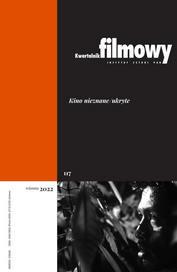Wobec zła. Problem gnozy w polskich filmach Andrzeja Żuławskiego z lat 70.
Facing Evil: The Problem of Gnosis in Andrzej Żuławski’s Polish Films of the 1970s
Author(s): Marcin Maron Subject(s): Cultural history, Cognitive Psychology, Post-War period (1950 - 1989), Film / Cinema / Cinematography, History of Art
Published by: Instytut Sztuki Polskiej Akademii Nauk
Keywords: Andrzej Żuławski; gnosis; evil; Apocalypse; Polish film;
Summary/Abstract: The article concerns three Polish films directed by Andrzej Żuławski in the 1970s: Trzecia część nocy (The Third Part of Night, 1971), Diabeł (The Devil, 1972) and Na srebrnym globie (On the Silver Globe, 1976-77/1986-87). It discusses them in the context of inspirations and similarities with gnosis, understood as a trend of existential (Hans Jonas), religious (Kurt Rudolph) and ideological (Eric Voegelin) experience and thinking, as well as an “artistic myth” (Hans Blumenberg), making it possible to create a tale about the ambivalences of the human condition. The principal themes of Żuławski’s film works, common to all kinds of gnosis, are the question of the causes of evil and the problem of man’s alienation, as well as the related issues of self-cognition and cognition of the world. Gnostic motifs occur in Żuławski’s films in four basic aspects: as a vision of the world marked by downfall and the workings of evil; in the lives of protagonists, who are usually hyper-sensitive people, experiencing apocalyptical illuminations; in love and eroticism, which cause a cognitive shock in the protagonists, and, finally, on a more general level, in the idea of art as rebellion.
Journal: Kwartalnik Filmowy
- Issue Year: 2022
- Issue No: 117
- Page Range: 50-76
- Page Count: 27
- Language: Polish

